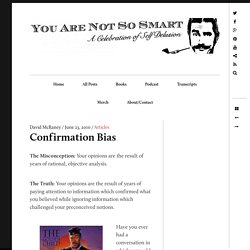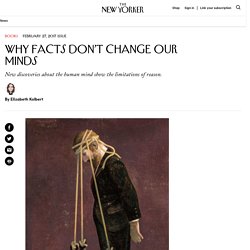

Brilliant things happen in calm minds - Treadmill. True AI is both logically possible and utterly implausible. Suppose you enter a dark room in an unknown building.

You might panic about monsters that could be lurking in the dark. Or you could just turn on the light, to avoid bumping into furniture. The dark room is the future of artificial intelligence (AI). Confirmation Bias – You Are Not So Smart. The Misconception: Your opinions are the result of years of rational, objective analysis.

Why Facts Don’t Change Our Minds. In 1975, researchers at Stanford invited a group of undergraduates to take part in a study about suicide.

They were presented with pairs of suicide notes. In each pair, one note had been composed by a random individual, the other by a person who had subsequently taken his own life. The students were then asked to distinguish between the genuine notes and the fake ones. Some students discovered that they had a genius for the task. Out of twenty-five pairs of notes, they correctly identified the real one twenty-four times. Donald Trump Logical Fallacies. Analyzing Trump: 15 Logical Fallacies in 3 Minutes. Philosophical Battles: Empiricism versus Rationalism - dummies. Locke, Berkeley, & Empiricism: Crash Course Philosophy #6. Beyond Lying: Donald Trump’s Authoritarian Reality. Trump has taken an entirely distinct approach to the problem of mass communication.

In “Origins of Totalitarianism,” Hannah Arendt writes: Like the earlier mob leaders, the spokesmen for totalitarian movements possessed an unerring instinct for anything that ordinary party propaganda or public opinion did not care to touch. Everything hidden, everything passed over in silence, became of major significance, regardless of its own intrinsic importance. The mob really believed that truth was whatever respectable society had hypocritically passed over, or covered with corruption … The modern masses do not believe in anything visible, in the reality of their own experience … What convinces masses are not facts, and not even invented facts, but only the consistency of the system of which they are presumably part. Donald Trump is trying to define a simple reality as a means to express his power. In the United States, around 14 percent of the population is of African-American descent. Cognitive bias cheat sheet.
Great, how am I supposed to remember all of this?

You don’t have to. But you can start by remembering these four giant problems our brains have evolved to deal with over the last few million years (and maybe bookmark this page if you want to occasionally reference it for the exact bias you’re looking for): Information overload sucks, so we aggressively filter.Lack of meaning is confusing, so we fill in the gaps.Need to act fast lest we lose our chance, so we jump to conclusions.This isn’t getting easier, so we try to remember the important bits.
Earth - We might live in a computer program, but it may not matter. Are you real?

What about me? These used to be questions that only philosophers worried about. Scientists just got on with figuring out how the world is, and why. But some of the current best guesses about how the world is seem to leave the question hanging over science too. Larry Sanger's Knowledge Free-for-All. Observer review: The Art of Always Being Right by Arthur Schopenhauer. The Art of Always Being Rightby Arthur Schopenhaueredited by AC GraylingGibson Square Books £9.99, pp190 Schopenhauer died 145 years ago.

His strange essay, 'The Art of Always Being Right', was not published in full during his lifetime, though he somewhat apologetically published the introduction to it among his final collection of essays, Parerga and Paralipomena. The present edited version is based on a translation by T Bailey Saunders, published by Macmillan in 1896: thus, for most readers, it is a new work. Though Schopenhauer followed Kant in believing that our knowledge of the world is confined to knowledge of appearance rather than reality, unlike Kant, he believed that we can discover clues to reality from our own self-knowledge. The Matrix Trilogy: Philosophical Influences. Philosophy and the Matrix - Return to the Source (Full Documentary)
MATRIX PHILOSOPHY (summary) Empiricism versus Rationalism. Chapter 1 Lecture: High-Context & Low-Context Culture Styles. Anthropologist Edward T.

Hall’s theory of high- and low-context culture helps us better understand the powerful effect culture has on communication. A key factor in his theory is context. This relates to the framework, background, and surrounding circumstances in which communication or an event takes place. The following summary highlights the problems facing low-context North Americans when they interact with people from high-context cultures.
High-context cultures (including much of the Middle East, Asia, Africa, and South America) are relational, collectivist, intuitive, and contemplative. Low-context cultures (including North America and much of Western Europe) are logical, linear, individualistic, and action-oriented. Discussion: Do you believe Hall is correct in his assumptions? ¨ Tip: Employees from all nations are represented in American business. How Culture Molds Habits Of Thought. For more than a century, Western philosophers and psychologists have based their discussions of mental life on a cardinal assumption: that the same basic processes underlie all human thought, whether in the mountains of Tibet or the grasslands of the Serengeti.

Cultural differences might dictate what people thought about. Logical relativism: logic, grammar, and arithmetic in cultural comparison. Page 4 of 41 Greiffenhagen, C. and W.

Sharrock (2006). Logical relativism: logic, grammar, and arithmetic in culturalcomparison. Configurations 14. An Illustrated Book of Bad Arguments. A reader recently wrote in asking if I could share a bit about the process of putting the book together and talk about how the project started. Certainly. 5 Logical Fallacies from the Gun Debate - ReThink. In 1764, before the United States was even a nation, four Lenape warriors entered a school in Pennsylvania, shot a schoolmaster, and killed nine children.
Urged to do something as a result of this tragedy, the Pennsylvania Assembly reintroduced the scalp bounty system, in which the province would pay settlers to bring them the scalps of enemy American Indians. Thus began the long, long controversy over gun control laws in America. 5 Logical Fallacies That Make You Wrong More Than You Think.
The Internet has introduced a golden age of ill-informed arguments. You can't post a video of an adorable kitten without a raging debate about pet issues spawning in the comment section. These days, everyone is a pundit. But with all those different perspectives on important issues flying around, you'd think we'd be getting smarter and more informed.
Logical Fallacies Infographic. Inductive Reasoning - How Small Observations Infers a Theory. Induction vs deduction. Deductive and inductive reasoning. The 12 cognitive biases that prevent you from being rational. IQ Test, smart, dumb, mensa.